★★★★
“I tried to come up with some cute pun on “chocolate bar” but couldn’t quite work one out.”

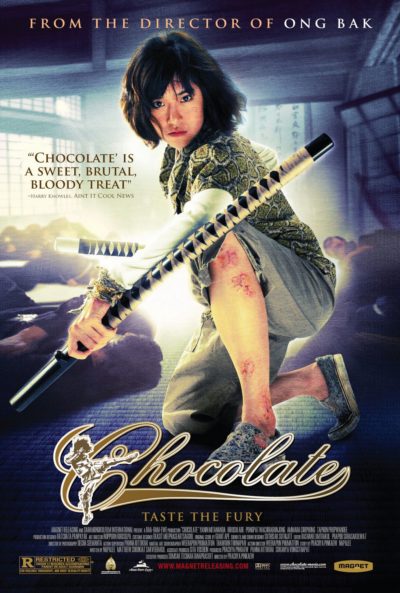 We couldn’t wait for this one to get an official American release, so off to Ebay we went for a copy of uncertain origin. This was something of a double-edged sword. It means we get to tell you that this is, hands down, the action heroine film of the year, with fights the like of which I haven’t seen since Yuen Wo Ping was working with Cynthia Khan in Hong Kong. However, it also means that we had to suffer the worst set of English subtitles I think we have ever seen, which appear to have been pushed enthusiastically through Babelfish several times, with feeling; this culminated in a line which will live forever in my memory. It is, and I quote the subtitle in its entirety, “Wang monkeys.” You’ll thus forgive me if the subtleties of the plot were perhaps lost on us, though by most accounts, this likely improved our enjoyment of the endeavour overall.
We couldn’t wait for this one to get an official American release, so off to Ebay we went for a copy of uncertain origin. This was something of a double-edged sword. It means we get to tell you that this is, hands down, the action heroine film of the year, with fights the like of which I haven’t seen since Yuen Wo Ping was working with Cynthia Khan in Hong Kong. However, it also means that we had to suffer the worst set of English subtitles I think we have ever seen, which appear to have been pushed enthusiastically through Babelfish several times, with feeling; this culminated in a line which will live forever in my memory. It is, and I quote the subtitle in its entirety, “Wang monkeys.” You’ll thus forgive me if the subtleties of the plot were perhaps lost on us, though by most accounts, this likely improved our enjoyment of the endeavour overall.
Zen (Vismistananda) is the autistic daughter of a Japanese gangster and a Thai woman (Siripong), who betrayed her local partner, a rival boss (Wachirabunjong), to be with her lover. When her mother gets cancer, it’s up to Zen and a chubby friend (Phobwandee) to collect on debts owed. Fortunately, Zen has a sponge-like ability to learn martial arts, be it from Tony Jaa movies on TV, or the school next door, and proves herself adept at “encouraging,” shall we say, repayments from those who are reluctant to pony up. The bad news is, this attracts the attention of her mother’s former employer, who has not forgotten the past and is unwilling to let matters lie. Which, inevitably, leads to a showdown where Zen takes on an apparently infinite line of henchmen – it’s somewhat reminiscent of Kill Bill, Volume 1, in the same way an earlier ice-house battle reminded me of The Big Boss, However, the final fight, on a series of balconies, is bone-shatteringly unique.
If Vismistananda isn’t yet quite up to the level of Jaa – there’s nothing quite like the five-minute, single shot fight scene in The Protector – she is amazingly lithe and powerful, quite belying her waif-like physique. There is some use of undercranking and wire-work that occasionally distracts from her natural talent, as much as it enhances it, and I have to wonder if the ‘autism’ plot-device was a cunning plot to cover for lack of actual actimg talent, though this angle is not played anywhere near as exploitatively as it could be. Still, if the dramatic aspects are somewhat perfunctory and uninteresting, the fight scenes more than make up for these shortcomings, and the result is quite the kick-ass action flick.





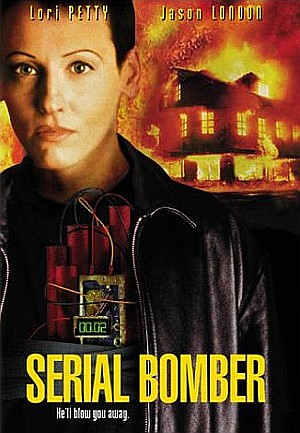 Mad bomber Chris Murdoch (London), is running around Seattle, blowing up Japanese people. FBI agent, Sara Davis (Petty) is part of the team looking into the case, but though they take Murdoch’s Japanese girlfriend (Kawagoe) into custody, Lt Sugimura (Amami) of the Tokyo police sweeps in and demands they release her, so she can be returned home – her father has influence on both sides of the Pacific. Davis won’t let that happen, since the girl is their main hope of catching the bomber; he, needless to say, is none too pleased to find the love of his life in the hands of the police.
Mad bomber Chris Murdoch (London), is running around Seattle, blowing up Japanese people. FBI agent, Sara Davis (Petty) is part of the team looking into the case, but though they take Murdoch’s Japanese girlfriend (Kawagoe) into custody, Lt Sugimura (Amami) of the Tokyo police sweeps in and demands they release her, so she can be returned home – her father has influence on both sides of the Pacific. Davis won’t let that happen, since the girl is their main hope of catching the bomber; he, needless to say, is none too pleased to find the love of his life in the hands of the police.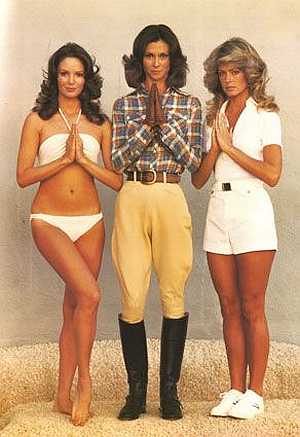 I suppose my main surprise is how pedestrian this was. Action? Hardly anything to speak of at all, despite the credit sequence which shows them training as police officers. The story has them going undercover at a vineyard, whose owner vanished seven years ago, and is about to be declared legally-dead: his ex-wife (Muldaur) and the sleazy foreman will clean up…unless the daughter, also missing, shows up. Of course, the Angels play both a fake daughter (Smith) and the ‘real’ thing (Jackson) – the former is designed to be exposed, in order to get herself involved with the wife and foreman, and reveal what’s going on. Quite cunning, really.
I suppose my main surprise is how pedestrian this was. Action? Hardly anything to speak of at all, despite the credit sequence which shows them training as police officers. The story has them going undercover at a vineyard, whose owner vanished seven years ago, and is about to be declared legally-dead: his ex-wife (Muldaur) and the sleazy foreman will clean up…unless the daughter, also missing, shows up. Of course, the Angels play both a fake daughter (Smith) and the ‘real’ thing (Jackson) – the former is designed to be exposed, in order to get herself involved with the wife and foreman, and reveal what’s going on. Quite cunning, really.
 Perhaps I was expecting too much, after reading reviews that
Perhaps I was expecting too much, after reading reviews that  Director Ichimura returned for the fourth episode, and despite similar problems as the third installment – most obviously, an apparent doubt that Oichi’s character can hold the viewer’s interest by herself – makes a much better stab at things here. Bounty-hunter Oichi finds out what life is like on the other side of the law, after she helps rescue an unwilling bride from a local magistrate; he slaps a 100 gold-piece reward on her head, which naturally, brings other bounty-hunters on her trail, led by Sankuro (Meguro).
Director Ichimura returned for the fourth episode, and despite similar problems as the third installment – most obviously, an apparent doubt that Oichi’s character can hold the viewer’s interest by herself – makes a much better stab at things here. Bounty-hunter Oichi finds out what life is like on the other side of the law, after she helps rescue an unwilling bride from a local magistrate; he slaps a 100 gold-piece reward on her head, which naturally, brings other bounty-hunters on her trail, led by Sankuro (Meguro).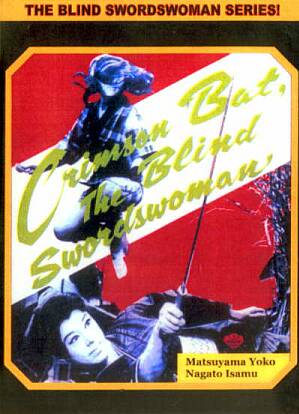 We meet our heroine Oichi as a young child, who has just been being abandoned by her mother – not sure what happened to father, but we later discover Mom’s a prostitute, so can probably fill in the blanks ourselves. To make matters worse, the tree under which Oichi takes shelter from a storm is struck by lightning, rendering her totally blind, in a way that’s – probably wisely – left medically unexplained. However, she is then taken in by a kind gentleman, who brings her up, and on into adulthood.
We meet our heroine Oichi as a young child, who has just been being abandoned by her mother – not sure what happened to father, but we later discover Mom’s a prostitute, so can probably fill in the blanks ourselves. To make matters worse, the tree under which Oichi takes shelter from a storm is struck by lightning, rendering her totally blind, in a way that’s – probably wisely – left medically unexplained. However, she is then taken in by a kind gentleman, who brings her up, and on into adulthood.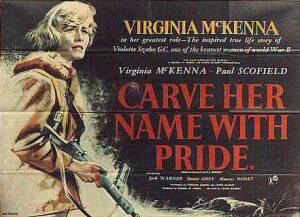 This is based on a true story, so we know from the start this is going to end in front of a firing-squad – at least until the Hollywood remake, with a happy ending. Given this, the film still tries to crank up the tension, but as written, Violette Szabo comes off as beyond saintly, without flaws or imperfections. Almost as irritating, she is shown as being mostly inspired by the death of her husband, rather than any innate patriotism (Charlotte Gray similarly portrayed a female SOE agent as passive-reactive). Having said that, the movie generally stays true to the facts, though the poem supposedly written by her husband was actually, in far less romantic reality, by her SOE codemaster – interestingly, the SOE’s name is not mentioned at all. Much of the end is fictionalised; details of her interrogation, for example, are obviously unavailable.
This is based on a true story, so we know from the start this is going to end in front of a firing-squad – at least until the Hollywood remake, with a happy ending. Given this, the film still tries to crank up the tension, but as written, Violette Szabo comes off as beyond saintly, without flaws or imperfections. Almost as irritating, she is shown as being mostly inspired by the death of her husband, rather than any innate patriotism (Charlotte Gray similarly portrayed a female SOE agent as passive-reactive). Having said that, the movie generally stays true to the facts, though the poem supposedly written by her husband was actually, in far less romantic reality, by her SOE codemaster – interestingly, the SOE’s name is not mentioned at all. Much of the end is fictionalised; details of her interrogation, for example, are obviously unavailable.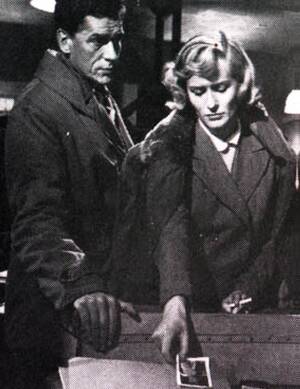 The film does take
The film does take 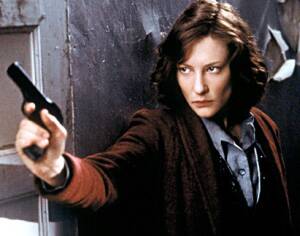 Love story or wartime thriller? The script here tries to have it both ways, and as a result of this uncertainty, the undeniable potential in the idea is unfulfilled. Gray (Blanchett) is dropped into Vichy France during World War II as an agent, but her bosses don’t realise she is more interested in finding her pilot lover (Penry-Jones), who’s been shot down nearby. While conflict between love, and love of country, would have been interesting, the former is almost ignored, then disposed of in a thoroughly unconvincing manner. Not that this diversion is uninteresting; you get a real sense of the terrors of war, with people being “vanished” in seconds, and the tension of living your life on a knife-edge behind enemy lines.
Love story or wartime thriller? The script here tries to have it both ways, and as a result of this uncertainty, the undeniable potential in the idea is unfulfilled. Gray (Blanchett) is dropped into Vichy France during World War II as an agent, but her bosses don’t realise she is more interested in finding her pilot lover (Penry-Jones), who’s been shot down nearby. While conflict between love, and love of country, would have been interesting, the former is almost ignored, then disposed of in a thoroughly unconvincing manner. Not that this diversion is uninteresting; you get a real sense of the terrors of war, with people being “vanished” in seconds, and the tension of living your life on a knife-edge behind enemy lines.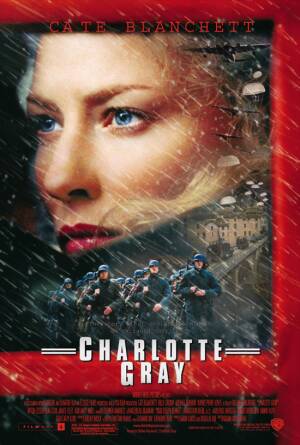 Mostly, the film is concerned with Charlotte’s protection of two Jewish children, and involvement in a resistance cell led by Julien (Crudup). They’re communists, so the British don’t really like them, but they’re convenient – and can be abandoned when necessary, the revelation of which provides the film with its most chilling moment. Blanchett has the right steely resolve for the role, and the cast is generally excellent; particular credit to Gambon (magnificently surly as Julien’s father), Ron Cook as Gray’s contact, and Anton Lesser, an oily collaborator who had us screaming “Die! Die!” at the TV set.
Mostly, the film is concerned with Charlotte’s protection of two Jewish children, and involvement in a resistance cell led by Julien (Crudup). They’re communists, so the British don’t really like them, but they’re convenient – and can be abandoned when necessary, the revelation of which provides the film with its most chilling moment. Blanchett has the right steely resolve for the role, and the cast is generally excellent; particular credit to Gambon (magnificently surly as Julien’s father), Ron Cook as Gray’s contact, and Anton Lesser, an oily collaborator who had us screaming “Die! Die!” at the TV set.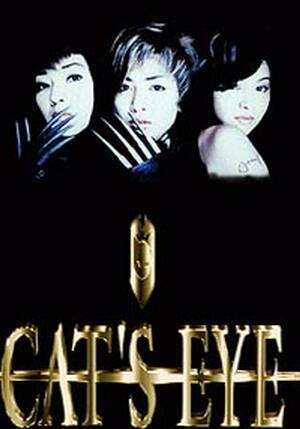 Despite an overall rating that is only mildly above average, when this is good, it is
Despite an overall rating that is only mildly above average, when this is good, it is